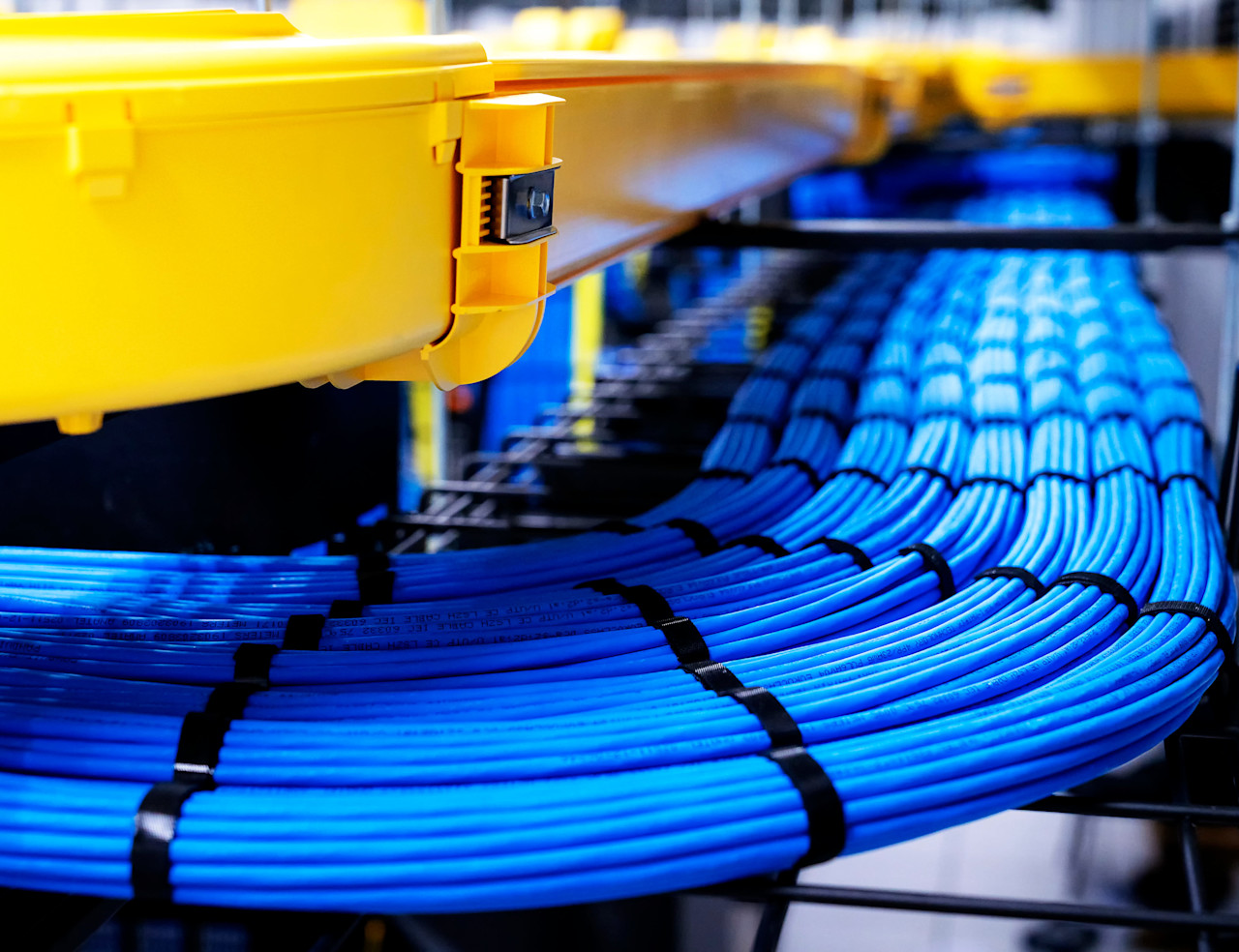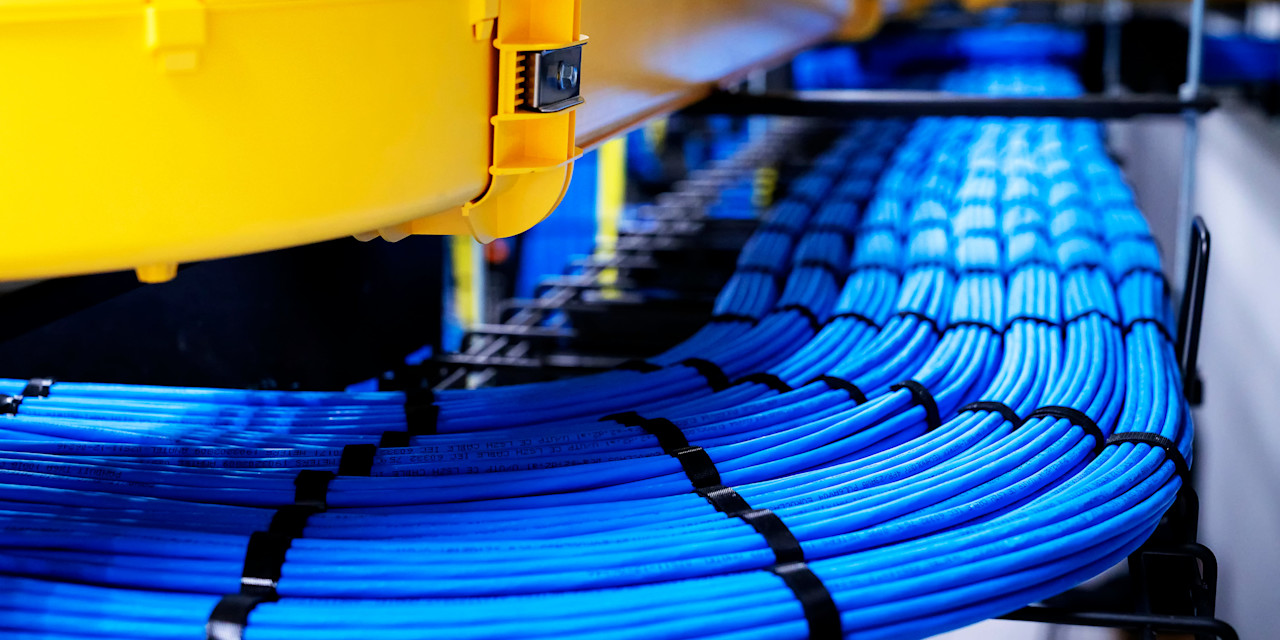

Data center clouds could rain revenue for water companies
Digitization and AI acceleration are intensifying not only processing speeds but also energy use and heat generation. The increasing energy intensity of traditional air-based cooling systems is driving data center operators to seek liquid-based solutions, creating attractive long-term growth opportunities for the sustainable water strategy.
Summary
- Digitization and AI are raising data center temperatures and operational risks
- Liquid-based solutions are more resource-efficient compared to air cooling
- Water-related services are critical for data center cooling and performance
AI promises to be revolutionary as companies design applications to harness its power to enhance processes and products. But AI’s intensified computational demand also means more electric power and more heat surging through data centers. To illustrate, an average ChatGPT query needs nearly 10 times as much electricity as a Google search.1 And it’s not just AI: rapid digitalization, electrification, and automation trends are also increasing data center workloads.
After decades of incremental growth, data center power demand is forecasted to increase by 160% in the few short years to 2030.2
Figure 1 – Data center power demand will skyrocket in the next decade

Source: Masanet et al. (2020), Cisco, IEA, Goldman Sachs Research.
Heat advisory
All that concentrated computational power is also generating lots of heat, straining data center cooling systems and putting processing performance at risk.
Standard data centers running on CPU chips are recommended to work in a range of 18-27 °C. But power consumption of next-generation AI chips (GPUs) is four times that, pushing temperatures well beyond optimal operational bands.3,4 Above 40 °C, failure rates increase by a rate of 30% for every five-degree increase. 5
Extreme heat waves are also increasing outside air temperatures, further straining data center cooling systems. In 2022, high temperatures in the UK forced shutdowns of cloud service in both Google and Oracle data centers.6

Clean water
Data center dilemmas: more energy and water
Air cooling is energy intensive, consuming around 40% of a data center’s power supplies.7 Accelerated processing is driving those costs even higher. 8 That has pushed data center operators to integrate evaporative cooling that exploits the higher heat-absorbing capacity of water. This way, they can boost cooling with less energy and less cost compared to air-only systems.9,10
Moreover, evaporative cooling also humidifies data center air, reducing electrostatic discharge that can damage equipment and diminish performance. It also reduces the need for the harmful chemical refrigerants used in some forms of direct-air cooling. 11
Greater energy efficiency also means lower emissions, an increasingly powerful metric for data centers as they strive to achieve their own decarbonization targets as well as attract sustainably minded end-customers.
However, evaporative cooling can also be water intensive.12 Until now, air-cooling in combination with evaporative cooling has been sufficient for dissipating heat. But the technical evolution from CPUs to GPUs implies that next-generation data centers will also consume significantly more water. That’s a big problem for data centers in water-stressed areas where utilities may withhold water withdrawal permits.
That’s left the industry searching for more water-efficient evaporative technologies such as closed-circuit or adiabatic cooling that eliminate water loss.
Figure 2 – A closer look at evaporative cooling in data centers

Source: Techwire Asia, ST Engineering, 2022. Evaporative cooling is a solution that cools ambient air and direct to server racks in data centers. It uses chilled water to absorb heat which then evaporates and is vented outside or recirculated in a closed-circuit to eliminate water loss.
Stay informed on Climate investing
Liquid-based cooling is heating up
Water’s thermal capacity is 3,000 times higher than air’s, meaning it can absorb more heat using less energy and at less cost compared to air-based counterparts. This makes liquid-cooling solutions essential for the future of data center infrastructure.
Due to the need for more efficient innovations, the global data center cooling market was valued at USD 15.9 billion in 2023 with a CAGR of over 13.5% from 2024 through 2032. 13
Figure 3 – Global data center cooling market size, 2022-2032 (USD in billions)

Source: Global Market Insights, April 2024.
Interest in direct-liquid cooling (DLC), in particular, is heating up. DLC systems push cool water through pipes and tubes placed next to high-heat sources including rear-doors of server racks and even directly to chips.14 A recent market study shows 11% of data center operators currently use DLC and are eager to expand, while 61% are considering it for the future. 15
Another form of DLC, liquid immersive cooling, is also gaining traction among cutting-edge chip and enterprise server manufacturers. It involves submerging chips or entire servers in a thermally (but not electrically) conductive liquid increasing heat-transfer performance even more. Nvidia’s* CEO, Jensen Huang, revealed in March that its next iteration of servers will be liquid cooled.16
Water needed for more than cooling
To prevent mineral scaling, corrosion, and microbial growth, highly pure water with low conductivity is needed for liquid-based solutions, creating investment opportunities for solution providers across the water value chain. That means water analytics that measure pH, ions, and microbial levels will be crucial for maintaining water quality.
Beyond measurements, potential water treatment methods are also extensive and include ion exchange, reverse osmosis, or the addition of anti-corrosion, anti-scaling, and biocidal agents.
While liquid-cooling is the future, air-based cooling won’t disappear any time soon. That’s because the resource efficiency and cost effectiveness of cooling systems is affected by many variables including computing capacity, geographic climate, local energy grids, regulations as well as overall environmental impact. For these reasons major data center operators including Meta, Alphabet, Amazon, and Microsoft* as well as other Big Tech and AI leaders are investing in multiple cooling technologies that can be dynamically adapted to optimize energy and water resources as well as overall operational costs.
With clouds come rain
The increase in hyper-scaled, cloud-computing and AI trends means water will remain a critical part of data center performance, forging new streams of long-term growth for Robeco’s Sustainable Water strategy. The strategy invests in companies providing resource-efficient technologies for cooling systems.
Beyond investments in cooling system manufacturers, the water strategy invests in companies providing a full suite of water-related technologies and engineering services. These include basic water infrastructure (e.g., pumps, valves, and tubing) analytic testing, purifying treatments, recycling, and wastewater management, all of which will be needed to ensure optimal (and sustainable) data center performance.
Whether on the ground or in the cloud, opportunities are always afloat within the water strategy; and the team remains vigilantly on the lookout for water companies that can capitalize on cloud computing’s potential to generate abundant revenue rains.
*The Robeco Sustainable Water strategy is not invested in any of the stocks listed, nor should these references be considered as recommendations to buy, sell, or hold these or any securities.
Footnotes
1 Goldman Sachs, May 2024. ‘AI poised to drive 160% increase in power demand.’
2 Ibid.
3 Recommended ranges are from the American Society of Heating, Refrigerating and Air-conditioning Engineers (ASHRAE). Data Center Knowledge, January 2023. ‘Hot in Here: Is raising temperatures in data centers good for hardware?’
4 Robeco, November 2023. ‘The energy challenge of powering AI chips.’
5 Data Center Dynamics, November 2023. ‘The effects of high temperatures on hard drives.’
6 Bloomberg. July 2022. ‘Google, Oracle data centers knocked offline by London heat.’
7 US Department of Energy. May 2023. ‘DOE announces $40 million for more efficient cooling for data centers. ’
8 CRAC and CRAH are the two most common systems for air-based cooling. Like air conditioners, CRAC units use refrigerants and compressors, while CRAH units use chilled water and control valves for cooling.
9 https://www.computerweekly.com/blog/Ahead-in-the-Clouds/Why-water-usage-is-the-datacentre-industrys-dirty-little-secret, https://portacool.com/how-does-evaporative-cooling-work/
10 Air is a poor heat absorber and converter. One liter of water can pull 3000 times more energy (heat) than 1 liter of air. https://adwatec.com/benefits-of-water-cooling/efficiency/
11 See footnote 7.
12 In cases where the evaporated water that absorbs the heat isn’t recaptured within a closed-loop system.
13 https://www.gminsights.com/industry-analysis/data-center-cooling-market
14 https://sustainability.fb.com/2023-sustainability-report/ – Meta’s data centers rely on water for evaporative cooling during summers (and humidification during winters).
15 Uptime Institute, July 2022. ‘Direct liquid cooling: pressure is rising but constraints remain.’
16 Data Center Dynamics, March 2024. ‘Nvidia’s CEO confirms upcoming system will be liquid cooled.’
Important information
This information is for informational purposes only and should not be construed as an offer to sell or an invitation to buy any securities or products, nor as investment advice or recommendation. The contents of this document have not been reviewed by the Monetary Authority of Singapore (“MAS”). Robeco Singapore Private Limited holds a capital markets services license for fund management issued by the MAS and is subject to certain clientele restrictions under such license. An investment will involve a high degree of risk, and you should consider carefully whether an investment is suitable for you.






















